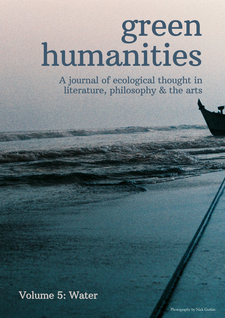Newspaper headlines and political discourse habituate us to alarming news about the intensifying dangers of global warming, hydraulic fracturing or ‘fracking,’ rising sea levels, and greenhouse gases. All too often, we become over-reliant on data-driven scientific approaches to the natural world at the expense of humanistic discourse. There has been a perceived schism between the humanities, seemingly on the sidelines or in an ivory tower, while the natural sciences frequently take the public spotlight and are thought to lead on environmental issues. We at Green Humanities believe in the power of the humanities–a book, a poem or a work of art for example—to influence public opinion and inspire engagement with ecological issues and causes. Green Humanities aims to place the humanities on the frontlines not only of cutting edge eco-criticism, but also of the environmental debates that will shape and determine our very world. We envision varied collaborations and juxtapositions of scholarship within the humanities as well as environmental sciences and related fields–all with the overarching goal of coaxing our global society toward a more sustainable future.
Current Volume: Volume 5 (2025) Water
What is water in our moment of ecological crisis? What can water as a commodity, as a metaphor, as an agent reveal about our anthropocentrism, the ecological crisis we have fostered and what could new water discourses, ontologies, politics and poetics offer to the generation of alternative futures? The diverse set of contributions that make up this fifth volume explore the capaciousness and generativity of water. We extend our gratitude to all of our contributors, for helping us navigate the many forms, forces and reflections of water, shaping new ways of seeing, thinking, acting and inhabiting a world in flux, within and beyond the pages of Green Humanities.Article
Poems
A PRAYER FOR THE SINKING CITY
Karen An-Wei Lee
FIGURE AFTER OPPEN
Aaron McCullough
FIGURE POSSESSION
Aaron McCullough
THE SEVEN CONCENTRIC RINGS OF THE ISLAND
Emily Tuszynska
WAITING FOR THE STORM
Emily Tuszynska
UNDER A HEAT DOME
Arthur Sze
SEVERE WEATHER ALERT
Madeleine Wattenberg
LOOKING BACK
Madeleine Wattenberg
IN THE SCIENCE LIBRARY
Madeleine Wattenberg
YOU HAVE THE RIGHT TO REMAIN.
Sarah Ann Winn
Field Notes
The Elizabeth River Project
Luísa Black Ellis
Artist Corner
Activist Corner
Tavignanu Vivu: A Corsican River Claims Its Rights
Coralie Boulard and Lucas Zabotin
Editor's Notes
Cover
Full Volume


